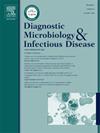Comprehensive surgical and medical management of massive fungal endocarditis in a preterm neonate: A rare case of survival and full recovery
IF 2.1
4区 医学
Q3 INFECTIOUS DISEASES
Diagnostic microbiology and infectious disease
Pub Date : 2025-03-04
DOI:10.1016/j.diagmicrobio.2025.116787
引用次数: 0
Abstract
Background
Fungal endocarditis in neonates, often caused by Candida albicans, is a rare but severe condition linked to invasive medical interventions. Preterm infants are particularly vulnerable due to their immature immune systems. Diagnosis is challenging due to nonspecific symptoms, and management typically requires both antifungal therapy and surgery.
Case report
A 43-day-old preterm female infant, born at 34 weeks with intrauterine growth restriction, presented with respiratory distress. She had been treated for suspected sepsis and found to have large tricuspid vegetations. Blood cultures confirmed Candida albicans. Despite initial antifungal treatment, surgery was performed due to the size of the vegetations. After surgery, the patient was treated with caspofungin, leading to clinical improvement. At 9-month follow-up, she showed full recovery with normal cardiac function.
Conclusion
This case demonstrates the successful management of neonatal fungal endocarditis through early diagnosis, surgical intervention, and appropriate antifungal therapy, leading to full recovery in a preterm neonate.
早产新生儿大面积真菌性心内膜炎的综合外科和内科治疗:一例存活并完全康复的罕见病例
背景:新生儿真菌性心内膜炎通常由白色念珠菌引起,是一种罕见但严重的疾病,与侵入性医疗干预有关。由于早产儿的免疫系统不成熟,他们特别容易受到伤害。由于非特异性症状,诊断具有挑战性,治疗通常需要抗真菌治疗和手术。病例报告一例43天大的早产女婴,出生时34周宫内生长受限,出现呼吸窘迫。她曾因疑似败血症接受治疗,发现有大的三尖瓣植被。血液培养证实为白色念珠菌。尽管最初进行了抗真菌治疗,但由于植被的大小,还是进行了手术。术后患者给予卡泊芬金治疗,临床改善。随访9个月,患者完全恢复,心功能正常。结论本病例通过早期诊断、手术干预和适当的抗真菌治疗,成功治疗了新生儿真菌性心内膜炎,使早产新生儿完全康复。
本文章由计算机程序翻译,如有差异,请以英文原文为准。
求助全文
约1分钟内获得全文
求助全文
来源期刊
CiteScore
5.30
自引率
3.40%
发文量
149
审稿时长
56 days
期刊介绍:
Diagnostic Microbiology and Infectious Disease keeps you informed of the latest developments in clinical microbiology and the diagnosis and treatment of infectious diseases. Packed with rigorously peer-reviewed articles and studies in bacteriology, immunology, immunoserology, infectious diseases, mycology, parasitology, and virology, the journal examines new procedures, unusual cases, controversial issues, and important new literature. Diagnostic Microbiology and Infectious Disease distinguished independent editorial board, consisting of experts from many medical specialties, ensures you extensive and authoritative coverage.

 求助内容:
求助内容: 应助结果提醒方式:
应助结果提醒方式:


